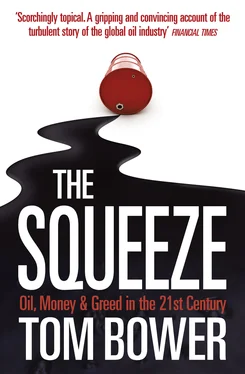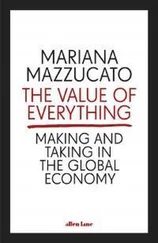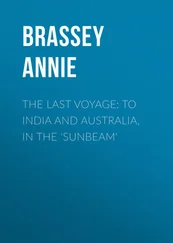This is my eighteenth book, and I have found that a career charting the lives of politicians, tycoons, murderers and charlatans was the perfect background to grappling with the intricacies of the oil industry. Fortunately, I encountered few refusals to my requests for help. Across the world, many key players offered me their insights. What has emerged, I believe, reveals how we are all simultaneously both the victims and the beneficiaries of The Squeeze.
In Vienna in May 2009, Ali al-Naimi was gambling against a squeeze by those speculating that prices would fall. One week after his prediction during his Ringstrasse run, the price of oil had risen from $62 to $68 a barrel. His gamble had been rewarded. Those who had speculated on falling prices had been squeezed by a counter-squeeze, talking up prices. Markets, like the subterranean rocks where oil is found, are unpredictable. Squeezes are often followed by bursts, and there are always casualties. Oil is a uniquely human story.
Tom BowerJuly 2009
ONE The Emperor
NEW YORK, 25 SEPTEMBER 2003
Lee Raymond did not conceal his impatience. The Russian president was 30 minutes late. Speaking in muted voices, the three other men and one woman waiting with Raymond in the Waldorf Astoria suite speculated whether Vladimir Putin had abandoned the meeting. ‘I’m sure he’ll come,’ suggested one. Raymond’s irritation was not assuaged.
Dealing with dictators was usual for Exxon’s 65-year-old chairman and chief executive. In his experience, oil was mostly controlled by feudalists, kleptocrats, zealots and fanatics. ‘Go to the top, do the deal and the rest follows,’ was Raymond’s way. Over recent years the chemical engineer born in South Dakota had encountered many of the world’s oil-rich despots. Renowned for his reserved, focused and analytical manner, he had run all those negotiations just the way he ran ExxonMobil itself – with clockwork efficiency. Oil, according to ExxonMobil’s textbook, never surprises; principles never changed, only the circumstances. Vladimir Putin, Raymond believed, was no different from other authoritarians except that he had nuclear weapons and controlled the world’s biggest oil and gas reserves. That justified the flight from Dallas and the unpleasantness of meeting another stranger.
Although outspoken and prone to steamroller those he disdained by the sheer weight of his intelligence, Raymond was awkward in the limelight. No concessions were offered to friends or opponents. Unglamorous and conscious of his harelip, he personified the arrogance which united the oil world in hatred, envy and admiration of ExxonMobil. Imbued with ExxonMobil’s genes, Raymond’s sense of the world was insular. Most non-Americans, in his opinion, especially those from the Third World, were disagreeable.
Today, however, was not the moment to betray his prejudices. Other heads of state had been exposed to his scorn, but, nearing the end of his 40-year career, Raymond ached to clinch this deal. If, as expected, Putin agreed in principle to ExxonMobil’s $45 billion offer, the company’s status as the world’s biggest oil corporation would remain unchallenged. Merit and the odds, Raymond calculated, were tilted in his favour.
For 18 months a small team under Rex Tillerson, Raymond’s deputy and heir apparent, had secretly vetted Yukos, a private Russian company which produced 20 per cent of the country’s oil. During his negotiations with Mikhail Khodorkovsky, the billionaire Jewish oligarch who controlled Yukos with a 44 per cent stake, Tillerson, a well-dressed Texan who despite appearances was just as tough as his boss, reassured himself that the company would be an outstanding purchase. With oilfields stretching across western Siberia, Yukos was a gem.
During the last weeks, the proposition had improved beyond Tillerson’s original imagination. Putin had approved Yukos’s merger with Sibneft, another private Russian oil company. Together, they would rank fourth in the world league, controlling one third of Russia’s oil production and growing at 20 per cent every year, three times faster than Russia’s state-owned oil industries – and beyond Putin’s control. The marriage of the two companies had been blessed by Mikhail Kasyanov, the prime minister, as ‘ a flagship forthe Russian economy.’ Combining Yukos’s production of 2.16 million barrels a day – no less than 2 per cent of the world’s output – with ExxonMobil’s similar production would eclipse all ExxonMobil’s rivals. Tillerson’s main concern remained the Kremlin’s reaction. In mid-2003 he had asked Khodorkovsky if the deal was politically acceptable. Khodorkovsky had replied emphatically, ‘Let me take care of this. I’ve spoken to Putin and it’s OK.’ Nothing, Tillerson believed, had changed in the last three months. On the contrary – the meeting with Putin was intended to seal the deal.
Khodorkovsky’s self-confidence was reassuring to the inflexibly direct Tillerson, who would be described by Dave Godfrey, a New York lawyer representing Yukos, as a ‘caricature of the top arrogant Czar giving out that it was an honour for me to negotiate with ExxonMobil’. Having successfully established an oilfield on Sakhalin, a Russian island in the Pacific, as ExxonMobil’s most profitable operation, Tillerson felt comfortable navigating through Russia’s political and economic turbulence. Khodorkovsky, he reassured Raymond, could deliver. Naturally, Raymond did not entirely rely on Tillerson. He had met Khodorkovsky in Dallas and Moscow, and got on well with him. Money cemented their mutual respect. Raymond, like Tiller-son, was inclined to accept Khodorkovsky’s good faith. But while Raymond acknowledged that there were events he could not control, Tillerson lacked awareness of the limits to ExxonMobil’s authority. The heir, most agreed, was nicer and more personable than the chairman, but not as wise. The less kind regarded them as more or less identical ExxonMobil models, except that Tillerson smiled.
As the chairman of the world’s biggest privately owned corporation, Lee Raymond’s priority was to look after the interests of ExxonMobil’s shareholders. ‘ExxonMobil is a company, not a government,’ he would tell those who urged the corporation to consider global warming, social inequalities and international relations with the oil-producing countries. Those topics, and especially ExxonMobil’s relationships with Third World governments, had become critical in recent years. Maintaining production had become a problem for all the major oil companies – ExxonMobil, BP, Shell, Chevron and Total. ExxonMobil in particular was engaged in contractual disputes about its operations with several governments. Like all the oil majors, the company was handicapped in its search for new reserves by Third World governments refusing to grant access on acceptable terms. In the Middle East, South America and Asia, self-interested nationalism was denying ExxonMobil commercially advantageous deals. This was partly a result of Raymond and his rivals alienating the rulers of the oil-producing nations. Unable to gain access on their terms to those countries, the oil majors held back, pleading that exploiting their reserves was ‘risky’, ‘unprofitable’ or ‘unviable’. Even in Saudi Arabia, the company’s trusted partner and the world’s biggest oil supplier, there was animosity. At the end of some particularly acrimonious negotiations with Crown Prince Saud al Faisal, Raymond had become exasperated by the Kingdom’s refusal to give Exxon a fair return. ‘We have better things to do with our money,’ he snapped. ‘If you don’t agree to what I’m offering, I’m off to play golf.’
The consequences of declining oil supplies to the global economy were incalculable, and the danger of a shortage was accelerating, although ample reserves lay under the earth. Russia’s vast untapped oil reserves promised some relief from that vicious circle. Both Raymond and Tiller-son recognised Russia as representing ExxonMobil’s best opportunity to reverse the company’s recent stagnation. Khodorkovsky was offering Raymond the ultimate prize, but more was at stake than ExxonMobil’s fortunes. Access to Russia’s oil would reduce OPEC’s supremacy and its self-interested pursuit of higher prices. Ever since the collapse of the Soviet Union in 1989, Russia had been a magnet for oil prospectors, and over the previous decade the Western oil majors had negotiated profitable deals. Some were judged, particularly by President Putin, to be excessively profitable, exploiting Russia’s vulnerability after the collapse of communism. Nevertheless, oil and gas had become the cornerstones of the country’s economic growth. Winning Putin’s trust, Raymond knew, was critical to completing the deal. If he failed, the Russian president’s antagonism could contribute to jeopardising the global economy. Those wider concerns had not troubled Raymond during his negotiations with Khodorkovsky. As always, ExxonMobil’s interests were his sole concern.
Читать дальше











![John Bruce - The Lettsomian Lectures on Diseases and Disorders of the Heart and Arteries in Middle and Advanced Life [1900-1901]](/books/749387/john-bruce-the-lettsomian-lectures-on-diseases-and-disorders-of-the-heart-and-arteries-in-middle-and-advanced-life-1900-1901-thumb.webp)
